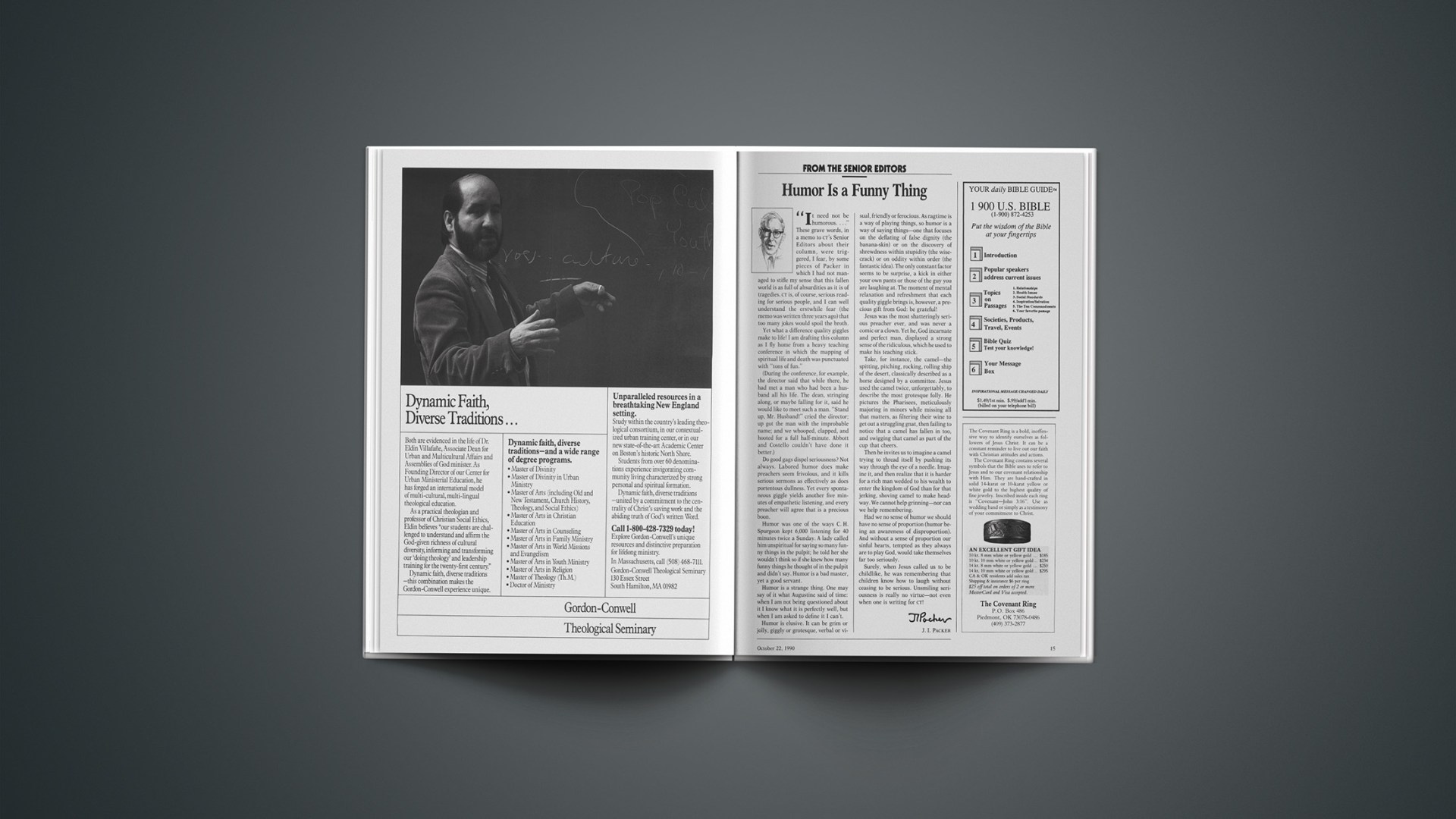“It need not be A humorous.…” These grave words, in a memo to CT’s Senior Editors about their column, were triggered, I fear, by some pieces of Packer in which I had not managed to stifle my sense that this fallen world is as full of absurdities as it is of tragedies. CT is, of course, serious reading for serious people, and I can well understand the erstwhile fear (the memo was written three years ago) that too many jokes would spoil the broth.
Yet what a difference quality giggles make to life! I am drafting this column as I fly home from a heavy teaching conference in which the mapping of spiritual life and death was punctuated with “tons of fun.”
(During the conference, for example, the director said that while there, he had met a man who had been a husband all his life. The dean, stringing along, or maybe falling for it, said he would like to meet such a man. “Stand up, Mr. Husband!” cried the director; up got the man with the improbable name; and we whooped, clapped, and hooted for a full half-minute. Abbott and Costello couldn’t have done it better.)
Do good gags dispel seriousness? Not always. Labored humor does make preachers seem frivolous, and it kills serious sermons as effectively as does portentous dullness. Yet every spontaneous giggle yields another five minutes of empathetic listening, and every preacher will agree that is a precious boon.
Humor was one of the ways C. H. Spurgeon kept 6,000 listening for 40 minutes twice a Sunday. A lady called him unspiritual for saying so many funny things in the pulpit; he told her she wouldn’t think so if she knew how many funny things he thought of in the pulpit and didn’t say. Humor is a bad master, yet a good servant.
Humor is a strange thing. One may say of it what Augustine said of time: when I am not being questioned about it I know what it is perfectly well, but when I am asked to define it I can’t.
Humor is elusive. It can be grim or jolly, giggly or grotesque, verbal or visual, friendly or ferocious. As ragtime is a way of playing things, so humor is a way of saying things—one that focuses on the deflating of false dignity (the banana-skin) or on the discovery of shrewdness within stupidity (the wisecrack) or on oddity within order (the fantastic idea). The only constant factor seems to be surprise, a kick in either your own pants or those of the guy you are laughing at. The moment of mental relaxation and refreshment that each quality giggle brings is, however, a precious gift from God: be grateful!
Jesus was the most shatteringly serious preacher ever, and was never a comic or a clown. Yet he, God incarnate and perfect man, displayed a strong sense of the ridiculous, which he used to make his teaching stick.
Take, for instance, the camel—the spitting, pitching, rocking, rolling ship of the desert, classically described as a horse designed by a committee. Jesus used the camel twice, unforgettably, to describe the most grotesque folly. He pictures the Pharisees, meticulously majoring in minors while missing all that matters, as filtering their wine to get out a struggling gnat, then failing to notice that a camel has fallen in too, and swigging that camel as part of the cup that cheers.
Then he invites us to imagine a camel trying to thread itself by pushing its way through the eye of a needle. Imagine it, and then realize that it is harder for a rich man wedded to his wealth to enter the kingdom of God than for that jerking, shoving camel to make headway. We cannot help grinning—nor can we help remembering.
Had we no sense of humor we should have no sense of proportion (humor being an awareness of disproportion). And without a sense of proportion our sinful hearts, tempted as they always are to play God, would take themselves far too seriously.
Surely, when Jesus called us to be childlike, he was remembering that children know how to laugh without ceasing to be serious. Unsmiling seriousness is really no virtue—not even when one is writing for CT!










